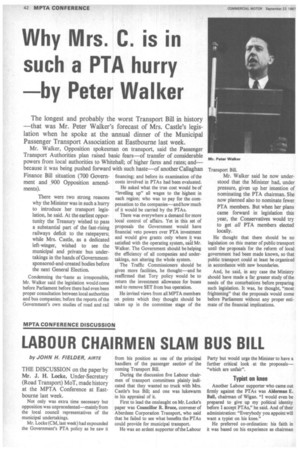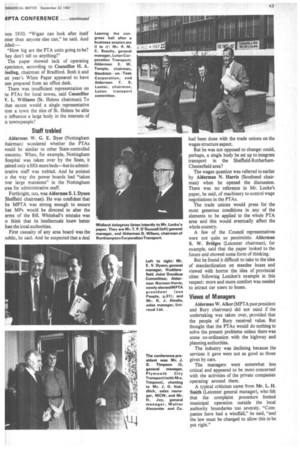LABOUR CHAIRMEN SLAM BUS BILL
Page 44

Page 45

If you've noticed an error in this article please click here to report it so we can fix it.
by JOHN H. FIELDER, AIRTE THE DISCUSSION on the paper by Mr. J. H. Locke, Under-Secretary (Road Transport) MoT, made history at the MPTA Conference at Eastbourne last week.
Not only was extra time necessary but opposition was unprecedented—mainly from the local council representatives of the municipal undertakings.
Mr. Locke (CM, last week) had expounded the Government's PTA policy as he saw it from his position as one of the principal handlers of the passenger section of the ' coming Transport Bill.
During the discussion five Labour chair' men of transport committees plainly indicated that they wanted no truck with Mrs. Castle's bus Bill; and one was lukewarm in his appraisal of it.
First to lead the onslaught on Mr. Locke's paper was Councillor R. Bruce, convener of Aberdeen Corporation Transport, who said that he failed to see what benefits the PTAs could provide for municipal transport.
He was an ardent supporter of the Labour Party but would urge the Minister to have a further critical look at the proposals— "which are unfair".
Typist on knee
Another Labour supporter who came out firmly against the PTAs was Alderman E. Ball, chairman of Wigan. "I would even be prepared to give up my political identity before I accept PTAs," he said. And of their administration: "Everybody you appoint will want a typist on his knee."
He preferred co-ordination: his faith in it was based on his experience as chairman nce 1930. "Wigan can look after itself etter than anyone else can," he said. And dded:— "How big are the PTA units going to be? ley don't tell us anything!"
The paper showed lack of operating xperience, according to Councillor H. A. lissling, chairman of Bradford. Both it and 1st year's White Paper appeared to have een prepared from an office desk.
There was insufficient representation on he PTAs for local towns, said Councillor V. L. Williams (St. Helens chairman). To uhat extent would a single representative rom a town the size of St. Helens be able o influence a large body in the interests of ts townspeople?
Staff trebled Alderman W. G. E. Dyer (Nottingham :hairman) wondered whether the PTAs would be similar to other State-controlled :oncerns. When, for example, Nottingham iospital was taken over by the State, it ;ained only a fifth more beds—but its adminiArative staff was trebled. And he pointed A) the way the power boards had "taken )ver large mansions" in the Nottingham trea for administrative staff.
Forthright, too, was Alderman S. I. Dyson Sheffield chairman). He was confident that he MPTA was strong enough to ensure :hat MPs would be directed to alter the ,erms of the Bill. Whitehall's mistake was :o think that its intellectuals knew better Ilan the local authorities.
First casualty of any area board was the Dublic, he said. And he suspected that a deal
had been done with the trade unions on the wages structure aspect.
But he was not opposed to change: could, perhaps, a single body be set up to integrate transport in the Sheffield-RotherhamChesterfield area?
The wages question was referred to earlier by Alderman N. Harris (Southend chairman) when he opened the discussion. There was no reference in Mr. Locke's paper, he said, of machinery to control wage negotiations in the PTAs.
The trade unions would press for the most generous conditions in any of the elements to be applied to the whole PTA area and this would eventually affect the whole country.
A few of the Council representatives were not quite so pessimistic. Alderman S. W. Bridges (Leicester chairman), for example, said that the paper looked to the future and showed some form of thinking.
But he found it difficult to take to the idea of standardization on standee buses and viewed with horror the idea of provincial cities following London's example in this respect: more and more comfort was needed to attract car users to buses.
Views of Managers Alderman W. Alker (MPTA past president and Bury chairman) did not mind if the undertaking was taken over, provided that the people of Bury received value. But thought that the PTAs would do nothing to solve the present problems unless there was some co-ordination with the highway and planning authorities.
The industry was declining because the services it gave were not as good as those given by cars.
The managers were somewhat less critical and appeared to be more concerned with the activities of the private companies operating' around them.
A typical criticism came from Mr. L. H. Smith (Leicester general manager), who felt that the complaint procedure limited municipal operation outside the local authority boundaries too severely. "Companies have had a windfall," he said, "and the law must be changed to allow this to be put right."




























































































































